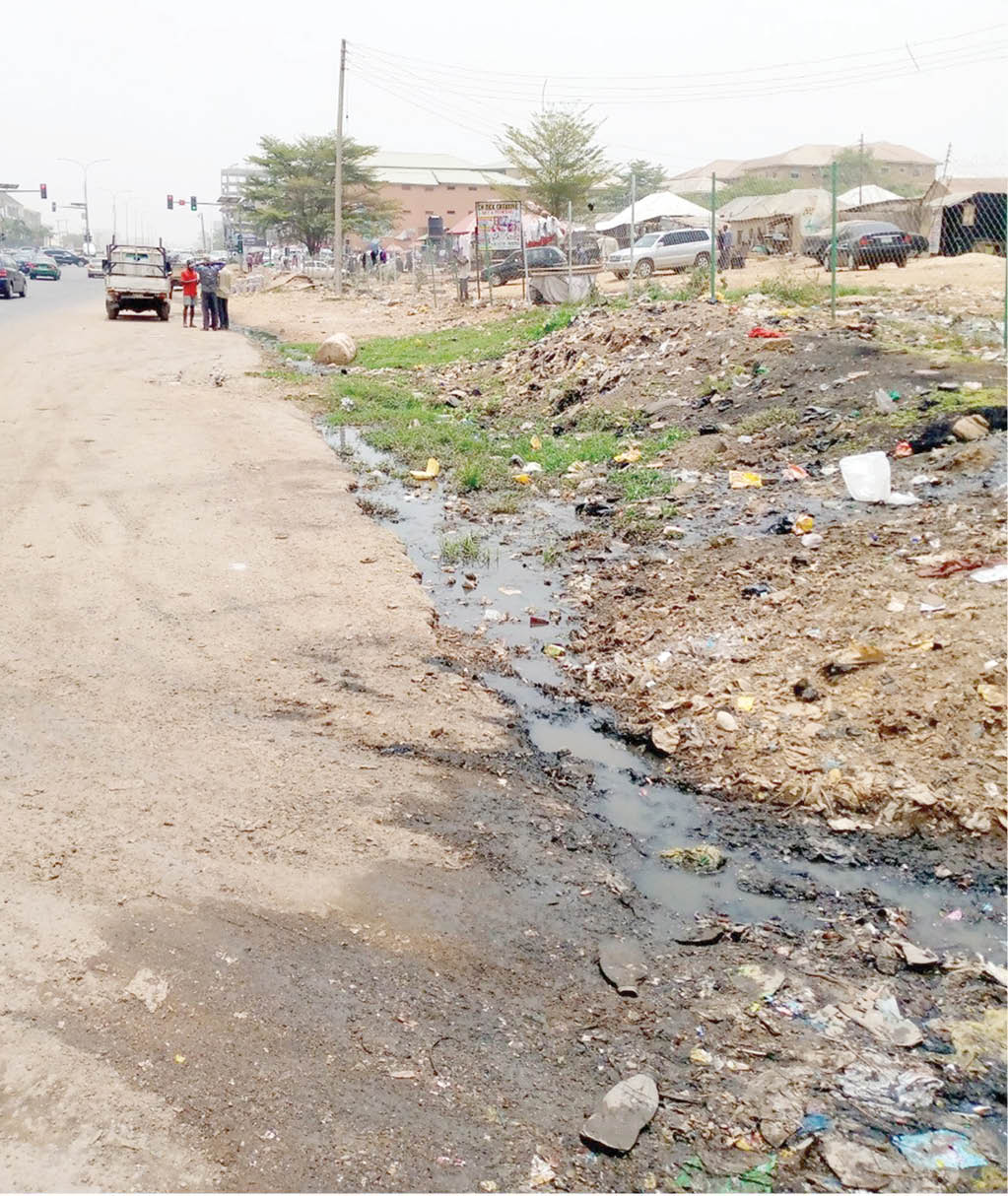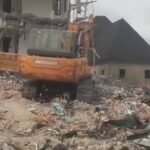Abuja as the pride of Nigeria ought to be synonymous with cleanliness but managing liquid waste in some of the metropolitan areas is proving to be a daunting task for the Abuja Environmental Protection Board (AEPB). Daily Trust examines the issues
Apart from some parts of the fastest growing capital city in Africa being littered with refuse and garbage which are most times left to rot and stink before being evacuated, in some areas, liquid waste is channeled onto the streets.
- After recovery of 11 soldiers’ bodies: Army denies killing 70, locals want probe
- Top septuagenarians rocking Nollywood
Though the AEPB has engaged 27 cleaning contractors, they struggle to keep the city clean.

Daily Trust learnt that the challenge of evacuating waste timely is exacerbated by poor payment of cleaners by waste management contractors.
At Addis Ababa Crescent in Wuse Zone 4, Abuja, liquid waste is channeled into the drainage channels and even onto the walkway, with a pungent stench polluting the air and the filthy environment not befitting the status of a capital city.
Residents of the area who have lamented the situation accused some of their neighbours of being responsible for the filth.
A resident on Benghazi Street, off Addis Ababa Crescent, said a woman who lives behind in a high rise tenement apartment on the crescent by Benghazi, cooks at home to take to her restaurant in the Central Bank of Nigeria (CBN) but throws all her liquid waste unto the walkway.
The neighbour who did not want to be mentioned, said the waste stinks and leaves the street dirty, adding that the woman who lives in block four of the building also contributes to noise pollution as she starts cooking at 2:00am and her clinking utensils wake everybody in the neighbourhood up.
Daily Trust also noticed that pipes are connected from the house unto Bengazi Street, channeling liquid waste into the gutter and on the walkway.
Also, Government Secondary School, Tudun Wada, Wuse Zone 4, has also perforated the fence in at least three places, guiding liquid waste unto Addis Ababa Crescent.
A resident who also spoke under condition of anonymity wondered why that would be happening in a capital city like Abuja.
“I am surprised that in a city like Abuja, people are allowed to do what they want. This whole vicinity has become unpleasant for living just because a few people have decided to pollute it with stench,” he said.
He called on the AEPB to compel the perpetrators of the environmental nuisance to do the right thing.
He further lamented that if the unhygienic practices are allowed to continue unabated, the health of residents may be seriously at risk.
“This is a time when everybody should be conscious about keeping the environment clean because of the COVID-19 pandemic but that appears not to be the case here.
“Though I am not a public health expert, common sense tells me that throwing liquid waste onto the street is unhealthy, especially now that rains haven’t come,” he added.
Also, along Solomon Lar Way, by Kpana Village, Jabi, a pool of murky water flows on the road towards the Chida Hotel traffic junction.

A resident, Yohanna Madaki, who spoke with Daily Trust, said the water which is waste generated from the village is channeled to the road, leaving the area with a pungent smell and a messy environment.
“The smell from the dirty water by the roadside is so strong that it churns your stomach whenever it passes by here.
“It is clear that people in this village are not managing their liquid waste properly and that is not good for the environment just as it is not good for human health,” he said.
On Ekukinam Street, Utako, a waste bin by a park near NUJ Secretariat was seen overflowing with refuse and offensive odour oozing from the bin.
In and around the Jabi Motor Park, the challenge is not just of waste management; it is of a more serious environmental menace as people urinate and defecate openly.
Smell of urine and faeces suffuses the air as one approaches the park.
A resident who did not want his name mentioned said the park did not have adequate conveniences and due to the high volume of passengers coming in and going from the park, it becomes difficult to keep a clean environment.
Worried by the challenges of environmental sanitation in the territory, and as part of measures to increase public awareness on sound environmental practices in all communities across the six area councils and to inculcate in residents, the habit of maintaining clean and hygienic environments in the satellite towns, FCT Minister of State, Dr. Ramatu Tijjani Aliyu, on Monday, flagged off inclusive sensitisation on environmental sanitation.
Performing the exercise in Kwali Area Council of the territory, Aliyu noted that the FCT Administration is required to “implement higher standards of environmental sanitation and orderliness” as its 4th Performance Deliverable under the Next Level Administration of President Muhammadu Buhari, and to achieve this, all hands must be on deck, and everyone has to take responsibility for her/his actions.
The minister said, “As we continue to grapple with the COVID-19 pandemic, it is important that communities take action to prevent further transmission, reduce the impacts of the outbreak, and support control measures. Proper waste management and good hygiene practices are critical to enhancing public health and are indispensable for optimal economic productivity.
“It is for this reason that the FCT Administration, through the Satellite Towns Development Department (STDD), initiated the “Inclusive Sensitisation On Environmental Sanitation” in all communities in the FCT, to ensure that everyone gets involved in taking actions to guarantee a healthy environment,” she said.
While noting that most of the diseases affecting people are as a result of poor environmental hygiene practices, the effect of which has been an increase in morbidity and mortality rates in children under five, Aliyu
assured that the FCT Administration shall continue to enforce existing policies and guidelines on issues related to acceptable waste management practices.
The minister stressed that indiscriminate disposal of wastes has an impact not only on public health, but also on human dignity and personal safety, noting that the scheme launched would greatly improve the health conditions of residents of the FCT and take a step closer to achieving one of the cardinal objectives of the administration while advancing the cause of Sustainable Development Goals (SDGs) attainment.

In his remarks, the FCT Permanent Secretary, Mr. Olusola Adesola, stated that the World Bank’s reports on the economic impact of poor sanitation across communities in Nigeria, estimated that Nigeria losses a whooping N455billion annually, representing 1.3 percent of the nation’s Gross Domestic Product (GDP).
Adesola, who was represented at the occasion by the Acting Secretary of Area Council Services Secretariat, Mrs. Omolola Olanipekun, said the event was a clear demonstration and very pungent commitment by the FCT Administration towards improving environmental sanitation and good hygiene across all communities of the six area councils.
He said: “Poor sanitation has become a major public health concern with unprecedented adverse impacts on all of us. It is common knowledge that diseases such as cholera, typhoid, dysentery, and diarrhea are linked to poor sanitary conditions. This goes to show that the state of sanitation of a particular community largely determines the health status and wellbeing of its residents.”
Meanwhile, the Director, Environmental Services, Satellite Town Development Department (STDD), Mr Olusegun Olusa, in his overview of the scheme said the FCT master plan made provision for development of sanitary/engineered landfills at Gosa in Abuja Municipal Area Council and Guabe in Kuje Area Council but regretted that both lands have been seriously encumbered.
He, however, assured that, “The FCDA is working on the design of an engineered landfill to be situated at 350 hectares currently being salvaged from 500 hectares originally provided for in the master plan at Gosa. When developed, it will serve as a final treatment site for waste from FCC and the area council.”

 Join Daily Trust WhatsApp Community For Quick Access To News and Happenings Around You.
Join Daily Trust WhatsApp Community For Quick Access To News and Happenings Around You.


